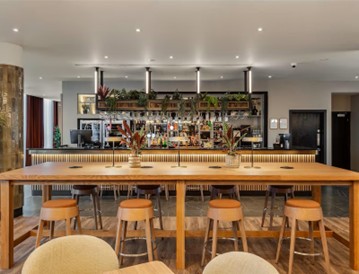Tourism plays a significant role in global emissions
According to UN Tourism data released at COP25, CO2 emissions from tourism are forecast to grow by 25% to 2030 (based on 2016 levels). Presently, the tourism industry accounts for roughly 8% of global emissions[i], and whilst much of this is attributable to transport, the hotel sector on its own delivers a notable 1% of global emissions.
The average hotel property is, perhaps unsurprisingly, energy intensive. The use of air conditioning systems, lighting, heating and equipment, driving consumption of electricity. While many hotel chains have introduced measures to cut energy use, this growing sector remains on course to deliver increased levels of carbon emissions in coming years.
The Global Hotel Decarbonisation Report from the World Sustainable Hospitality Alliance (WSHA) found that the hotel industry will need to reduce its carbon emissions by 66% per room by 2030, and by 90% per room by 2050, to ensure that the growth forecast for the industry does not lead to a corresponding increase in carbon emissions[ii].
To tackle mounting environmental impacts, many major hotel chains including the likes of Hilton, Marriot, and Accor have set company-wide net zero targets. However, taking this a step further some brands are seeking to set a ‘gold standard’ in meeting their green obligations, by way of certifying properties as ‘Net-Zero Hotels’.
Setting the standard with Net Zero Hotels
Achieving the badge of a Net-Zero Hotel is no mean feat; energy consumption, waste (including food, textiles, water, plastics), energy efficiency, recyclability, and the use of renewables must all be considered. It requires an audit of scope 1,2, and 3 emissions alongside implementation of the processes to record and monitor this moving forwards. However this holistic view reveals a major challenge, most of a hotel’s emissions are in fact embodied within the building itself. It is estimated that between 30-70% of a hotel’s carbon footprint consists of emissions produced in the hotel’s construction, ongoing maintenance, refurbishment, and eventual demolition.
Therefore, operators are faced with a dilemma: do they refurbish the building to become more environmentally sympathetic, or do they demolish the hotel and start from scratch with sustainability as the central focus?
Radisson opens two net zero hotels
Radisson Hotel Group recently revealed two verified net-zero properties, taking on the challenge of extensively refurbishing both a hotel in Manchester, England and a hotel in Oslo, Norway[iii]. The former ‘Park Inn by Radisson Manchester City Centre’ has now been renovated and renamed as the ‘Radisson Hotel Manchester City Centre, A Verified Net Zero Hotel’.

Source: Radisson Hotel Group
Both the Manchester and Oslo properties have had their alignment with the Net Zero Methodology for Hotels (set out by the WSHA), and SBTi requirements, independently verified by TÜV Rheinland.
According to the WSHA methodology, to reach net-zero hotels must implement the following five steps:
1. 2025: Calculation of emissions and creation of a decarbonization action plan
2. 2030: Procurement of renewable electricity and offsetting of residual emissions
3. 2035: Reduction of offsetting and increased decarbonization
4. 2040: Maximum carbon emissions reduction and offsetting of all remaining emissions
5. 2050: Intensive decarbonization of value chain and minimization of residual emissions[iv]
To tackle this, Radisson has assessed the carbon footprint from energy use (Scopes 1 & 2 as defined by the Greenhouse Gas Protocol or GHG), as well as the hotel’s operational and supply chain footprint (Scope 3).
Actions taken to reduce emissions include the use of 100% renewable energy, an overhaul of operations to minimize waste, re-evaluation of supply chains with a particular focus on Food & Beverage (F&B), and other sources of emissions such as hotel related transportation to minimise emissions. All remaining emissions are then compensated using Nature Based carbon credits.
Looking at F&B specifically, Radisson Hotel Group has partnered with Klimato to develop low-carbon menus by analysing the entire food offering for in-room dining menus, meeting & events menus and the breakfast buffet, curating recipes to lower their overall carbon footprint.
Inge Huijbrechts, Chief Sustainability & Security Officer at Radisson Hotel Group, said, “With the opening of our first two Verified Net Zero hotels, Radisson Hotel Group demonstrates its commitment to Net Zero 2050, and to showcasing truly sustainable hospitality. For the first time, we focus on reducing emissions from energy, operations and the supply chain”[v].
References
[i] Carbon Footprint of Tourism - Sustainable Travel International
[ii] Climate action - reducing emissions across the hospitality industry
[iii] Radisson Hotel Group launches first two Verified Net Zero hotels | News | Breaking Travel News
[iv] The Net Zero Methodology - Responsible Business | Radisson Hotels
[v] Radisson Hotel Group opens Manchester’s first Radisson-brand...





.jpg)
